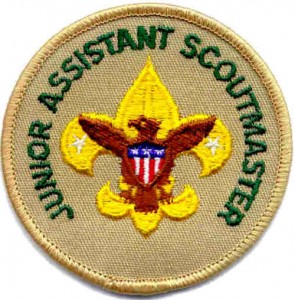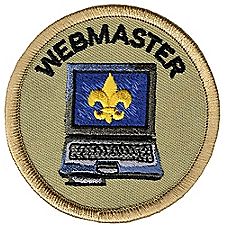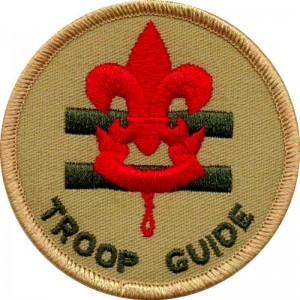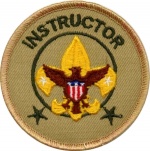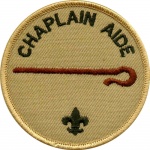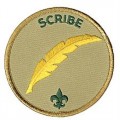Youth Leadership Roles
Troop Position of Responsibilities
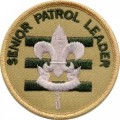 Senior Patrol Leader
Senior Patrol Leader
The Senior Patrol Leader (SPL) is elected by their fellow scouts to represent them as the most senior youth leader of the troop. The SPL is a youth who has attained the rank of a first class or higher. They are responsible for the troop’s overall operation. An effective SPL needs to attend at least 80% of all troop functions, and service projects as they are the focal point and success of the youth-led troop. With guidance from the Scoutmaster, they take charge of troop meetings, the patrol leaders’ council, and of all troop activities, and does everything they can to help each patrol be successful. They are responsible for annual program planning conferences and assists the Scoutmaster in conducting troop leadership training. The SPL presides over the Patrol Leaders’ council and works closely with each Patrol Leader to plan troop meetings and make arrangements for troop activities. An elected SPL is not a member of any patrol of the troop but may participate with a Venture patrol in high-adventure activities.
Assistant Senior Patrol Leader
An Assistant Senior Patrol Leader (ASPL) helps the SPL to lead meetings and activities. They are also responsible for taking the lead in the absence of the SPL. The ASPL helps to train and supervise the troop Scribe, Quartermaster, Instructor, Librarian, Historian, Webmaster and Chaplain Aide. The ASPL is elected by their unit members and serves as a member of the Patrol Leaders’ Council. The ASPL sets a good example to all the unit members, shows Scout Spirit and enthusiastically and correctly wears the Scout uniform.
Junior Assistant Scoutmaster
A Scout who is 16 years of age older and has shown outstanding leadership skills an is working towards attaining the Eagle Scout rank. This is the only leadership position that is appointed by the Scoutmaster. The Junior Assistant Scoutmaster (JAS) assists the Scoutmaster in providing support and supervision to other youth leaders within the troop. Upon his/her 18th birthday, a JAS will be eligible to become an Assistant Scoutmaster.
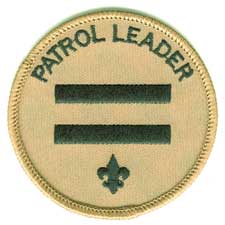
Patrol Leader
The Patrol Leader is elected by their patrol to represent the patrol at the PLs’ Council meetings. They are expected to attend at least 60% of all troop meetings, PLs’ council meetings, activities, and service projects. The Patrol Leader plans and steers the patrol meetings and appoints the Assistant Patrol Leader (APL) and makes sure that they are ready to assume the responsibilities of the APL during their absence. The Patrol Leader helps the junior scouts in his patrol to work towards their advancements and keeps their patrol informed of troop discussions from the PLs’ council meetings. They set a good example, show Scout Spirit, and enthusiastically and correctly wear the Scout uniform.
Troop Webmaster
The Webmaster works with various unit members on troop news and ensures that the troop website information is kept updated and current. The Webmaster is appointed by the Troop Committee or the Scoutmaster. The Webmaster works under the supervision of the Troop Committee Chairperson or an appointed adult leader.
The Troop Guide must attained the rank of a Life Scout and working towards the rank of an Eagle. They are expected to attend at least 75% of all troop meetings, PLs’ council meetings, functions and service projects. The Troop Guide performs their duties under the guidance of the Scoutmaster and works with new Scouts. They help them to feel comfortable and earn their First Class rank in their first year. The first year as a Scout is a critical time with new places, new people, new rules and activities. The Troop Guide is a mentor and friend to the new Scouts and makes the first year fun and successful. This is an important position and the Guide should take their responsibilities seriously. The Troop Guide teaches basic Scout skills to new Scouts and is the Patrol Leader of the new scout patrol. The Troop Guide sets a good example to all the unit members, shows Scout Spirit and enthusiastically and correctly wears the Scout uniform.
Troop Instructor
The Troop Instructor is a youth who has attained the rank of a Star, Life or Eagle Scout and is elected by the members of the unit. The Troop Instructor is expected to attend 75% of all troop meetings and activities.The responsibilities of the Instructor is to teach basic Scouting skills in a troop and patrols. Other duties may include scheduling and coordinating with the Merit Badge Counselor(s) for troop or scout instructions. They set a good example to all fellow Scouts, enthusiastically and correctly wear the Scout uniform, and show Scout Spirit as all times.
The Troop Quartermaster is elected by their unit members. The responsibilities of the Quartermaster include keeping a current record of all patrol and troop equipment. The Quartermaster is expected to attend 75% of all troop meetings and overnight outings where troop equipment inventory is much needed. They make sure that are equipment is in good working condition, issues equipment and makes sure it is returned in good, clean condition. The Quartermaster coordinates with the assigned troop committee member on equipment readiness for each troop or patrol camping/outing trip. When necessary, they provide a report at Patrol Leader’s Council and makes suggestions for new or replacement items. The Quartermaster sets a good example, enthusiastically and correctly wears the Scout uniform, and shows Scout spirit as all times.
The Troop Chaplain Aide must have at least attained the rank of a First Class Scout. They are expected to attend 65% of all troop meetings,outings, PLs’ council meetings and service projects. They are mature and sensitive, and have earned the respect and trust of fellow Scouts. The Troop Chaplain Aide should have received or be working on the requirements leading to the age-appropriate religious emblem for their faith. The Troop Chaplain Aide helps to plan for religious observance in troop or patrol activities and encourages saying grace at meals while camping or at other activities. The Troop Chaplain Aide helps to promote annual Scout Sunday. They set a good example, shows Scout Spirit, and enthusiastically and correctly wear the Scout uniform.
The Troop Historian must have at least attained the rank of a First Class Scout. The Troop Historian is expected to attend 65% of all troop meetings, PLs’ council meetings and service projects. They keep a historical record or scrapbook of troop activities. The Historian provides material for displays and presentations of current activities. The true value of a good Historian and their work does not show up until years later. In addition, the work of the Historian provides a link to the past. The Troop Historian should have received or be working on the requirements leading to the communications merit badge. They set a good example, shows Scout Spirit, and enthusiastically and correctly wear the Scout uniform.
The Troop Scribe must have at least attained the rank of a First Class Scout. The Troop Scribe is expected to attend 75% of all troop meetings and PLs’ council meetings and service projects. They record all PLs’ council meetings minutes and service projects activities. They set a good example, show Scout Spirit, and enthusiastically and correctly wear the Scout uniform.
The Troop OA Representative must have at least attained the rank of a First Class Scout and be an active member of the Order of Arrow. They are mature and expected to attend 75% of all troop meetings, activities and service projects. In addition, the Troop OA Representative is expected to attend 75% of all OA Fellowships and Lodge Executive Committee meetings, and work with the Lodge’s Troop Rep. committee. The Troop OA Representative announces upcoming OA fellowship activities information to the troop during troop meetings. They set a good example, show Scout Spirit, and enthusiastically and correctly wear the Scout uniform.
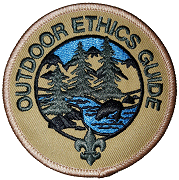
Outdoor Ethics Guide
The outdoor ethics guide helps the troop plan and conduct an outdoor program that emphasizes effectively practicing the principles of outdoor ethics. The guide works to help Scouts improve their outdoor ethics decision-making skills to minimize impacts as they participate in outdoor activities. They support Scouts who are working to complete the relevant requirements for the Tenderfoot, Second Class and First Class ranks. They should also work towards completing the Leave No Trace Awareness course as well as the Outdoor Ethics Awareness and Outdoor Ethics Action awards. They set a good example, show Scout Spirit, and enthusiastically and correctly wear the Scout uniform.


